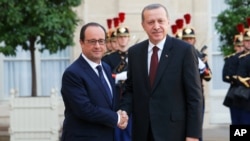With Turkey facing growing criticism from many of its Western allies, there is one nation it is developing closer ties with - France. Until recently, the two countries had endured a frosty relationship, but they are finding common ground over Syria.
NATO member Turkey has been at odds with many of its Western allies over Syria and the battle against the Islamic State.
But last month French President Francois Hollande hosted his Turkish counterpart, President Recep Tayyip Erdogan, in Paris and made clear both had similar views on strategy in Syria.
This meeting underscored a rapidly developing bilateral relationship, according to diplomatic columnist Kadri Gursel of the Turkish newspaper Milliyet and the Al Monitor website.
"After [French President Nicolas] Sarkozy has left office, relations between Turkey and France has become less complicated. We have to admit the bilateral between France and Turkey went quite well. On the economic perspective, on the political perspective and on the question related to Syrian question," said Gursel.
Hollande's predecessor, Nicolas Sarkozy, enraged Ankara by blocking its EU membership bid, arguing Turkey is not a European country. Relations were further soured by Sarkozy backing Armenia’s claim Ottoman Turkey committed genocide against its Armenian minority, a charge Ankara denies.
The Turkish government retaliated by shutting out French companies from the country’s large-scale construction projects. Carnegie Institute in Brussels visiting scholar Sinan Ulgen says French companies are benefiting from the improved relations.
"One certain benefit for France of this rapprochement, would be that the French companies who are interested in these big public contracts. This will open doors for French companies to the Turkish market in a way that has not been the case in the past, including Turkey’s second nuclear power plant, where the French nuclear company Ariva is likely to be part," said Ulgen.
Ulgen says with the projects, Hollande will be able to boost employment in France. Facing dismal approval ratings at the midpoint of his five-year term, the French president said in a recent television interview that he would not seek a second term if he could not reduce the nation’s stubbornly high unemployment rate of more than 10 percent.
Meanwhile, Paris is strongly backing Ankara’s call for the creation of safe havens in Syria, protected by a no-fly zone. It is also voicing support for the Turkish government’s call to broaden the war against the Islamic State to target the Syrian regime.
Erdogan has been frustrated by the strategy of the the coalition, saying they are ignoring the terrorist acts of Syrian President Assad's regime. He claimed it is not possible to fight IS when the coalition does not stand against the regime.
The warming of French-Turkish ties is being cemented by Ankara committing itself to work closely with its French counterparts in tracking French jihadists trying to join IS. But columnist Gursel warns Turkey and France are unlikely to achieve their goals on their own.
"France and Turkey cannot solve anything in Syria together, without the involvement of Great Britain and United States, and of course also without a great bargain, which will include Russia and Iran," he said.
But observers say Ankara will still feel emboldened by securing the support of a powerful ally in its policy towards Syria, and it will likely further harden its stance towards other allies in negotiations on how to fight IS.










